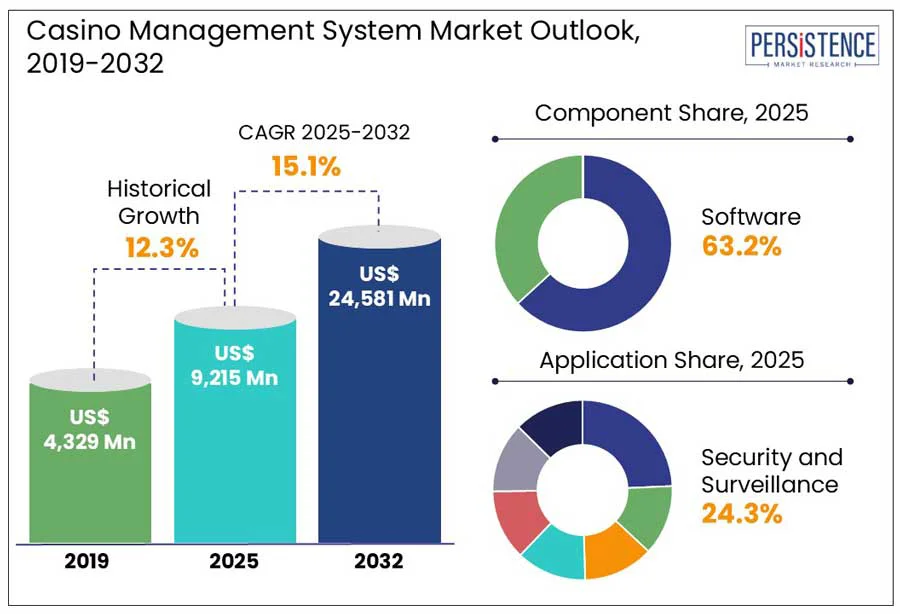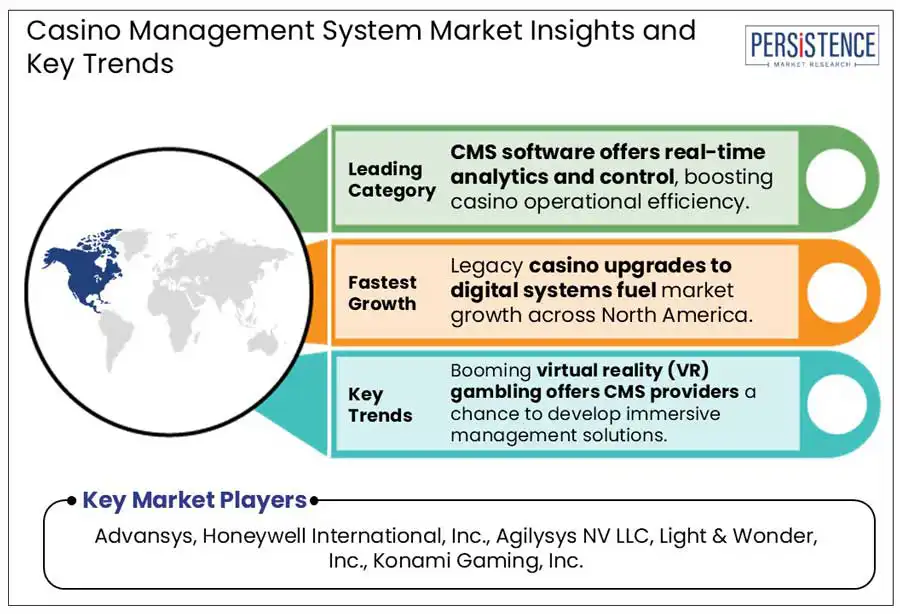ID: PMRREP35341| 190 Pages | 21 May 2025 | Format: PDF, Excel, PPT* | IT and Telecommunication

The global casino management system market size is predicted to reach US$ 24,581.0 Mn in 2032 from US$ 9,215.0 Mn in 2025. It will likely witness a CAGR of around 15.1% by 2032. Casino Management Systems (CMS) have become the digital backbone of modern gambling operations where every second counts and customer experience defines success. As casinos evolve into complex entertainment ecosystems, the demand for personalized engagement, operational control, and real-time visibility has never been high. CMS platforms are no longer limited to managing slot machines and tables. Instead, they now accelerate everything right from compliance tracking and predictive analytics to fraud detection and loyalty programs. With surging pressure from government agencies, CMS is anticipated to shape the future of secure and smart casino operations.

Key Industry Highlights:
|
Global Market Attribute |
Key Insights |
|
Casino Management System Market Size (2025E) |
US$ 9,215.0 Mn |
|
Market Value Forecast (2032F) |
US$ 24,581.0 Mn |
|
Projected Growth (CAGR 2025 to 2032) |
15.1% |
|
Historical Market Growth (CAGR 2019 to 2024) |
12.3% |
The casino management system market growth is mainly attributed to their ability to improve customer experience and foster loyalty through data-driven strategies and innovative technologies. Unique CMS platforms often leverage AI and machine learning to analyze player spending patterns, preferences, and behavior. This allows casinos to provide targeted marketing campaigns, personalized gaming experiences, and specific promotions.
CMS platforms also incorporate novel security features such as compliance tracking, fraud detection, and real-time monitoring to ensure a safe gaming environment. These measures help protect both customers and the casino, spurring reliability and trust. AI-based surveillance systems, for example, are capable of detecting unusual activities and alerting security personnel quickly, improving the safety of the casino.
Integration issues are considered a key challenge in the global market, specifically for operators functioning under tight financial constraints or those managing legacy infrastructures. A significant barrier is the technical complexity of integrating CMS with existing legacy systems. Several casinos, mainly old establishments, are highly dependent on outdated technologies that are incompatible with today’s CMS platforms. This requires extensive customization and result in high costs as well as prolonged implementation timelines.
Resistance to change and staff training also pose additional challenges. Casino staff require fast adaptation to new technologies and workflows for the successful integration of a CMS. The requirement for comprehensive training programs and resistance to change are predicted to slow down the adoption process. As per Casino QN, ensuring that staff members are adequately trained in using the new system is important to maximize its benefits. This is where the training management software market is beginning to play a significant role, helping casinos design trackable and structured learning programs to support smooth integration.
The rising complexity of gambling norms globally is creating lucrative opportunities for CMS providers. Regulatory bodies are rolling out stringent compliance measures, which are pushing casinos toward innovative CMS solutions to meet these demands. The European Union's Anti-Money Laundering Directive (AMLD), mandates robust compliance monitoring tools across gambling establishments. This norm has encouraged the adoption of CMS platforms equipped with features, including financial transaction analysis and real-time monitoring to detect and prevent illicit activities. Similarly, the Financial Crimes Enforcement Network (FinCEN) in the U.S. requires casinos to deploy comprehensive anti-money laundering programs. Such stringent norms emphasize the requirement for state-of-the-art CMS platforms.
The impact of non-compliance is evident in cases such as Tabcorp, which is one of the most prominent gambling companies in Australia. It was fined a record US$ 4.6 Mn by the Victorian Gambling and Casino Control Commission in 2024 for recurrent breaches of the gambling code. This included improper marketing practices and inadequate staff training. Similar incidents are expected to highlight the importance of CMS in ensuring regulatory compliance and preventing hefty fines. In parallel, the fraud detection and prevention market is emerging as a complementary force, providing technologies to help casinos efficiently monitor transactions, curb fraudulent activities, and detect anomalies. The integration of fraud detection tools with CMS will likely become a strategic necessity for casinos focusing on maintaining compliance.
Based on component, the market is bifurcated into software and services. Out of these, the software segment is expected to dominate with about 63.2% of the casino management system market share in 2025. This is primarily due to its ability to facilitate operational efficiency, security management, and real-time data analytics. International Game Technology (IGT), for example, introduced its next-generation CMS software in March 2024, featuring enhanced predictive analytics capabilities and player engagement tools. Such innovations are likely to allow casinos to ensure compliance with strict norms, improve resource allocation, and personalize customer experiences.
Services are speculated to showcase steady growth in the foreseeable future. It encompasses maintenance, integration, deployment, and consulting. Such accompanying services enable casinos to effectively use and implement software solutions. Companies such as BetConstruct, have partnered with several firms to provide comprehensive services, including digital marketing, casino risk management, and Customer Relationship Management (CRM). This highlights the rising demand for specialized expertise with surging complexity of CMS platforms.
By application, the market is divided into security and surveillance, analytics, accounting and cash management, player tracking, property management, and marketing and promotions. Among these, the security and surveillance segment is predicted to account for a share of approximately 24.3% in 2025. This is attributed to the integration of innovative technologies such as automated alert systems and facial recognition in CMS platforms to ensure regulatory compliance and safeguard assets. These novel features help casinos to respond quickly to potential threats, detect anomalies, and proactively monitor all activities, thereby maintaining a secure environment. The financial nature of casino operations, which involve significant cash transactions, makes them susceptible to theft and fraud. CMS platforms address these vulnerabilities by incorporating unique surveillance tools to monitor restricted areas, entrances, and gaming floors.
The analytics segment, on the other hand, will likely exhibit a considerable CAGR from 2025 to 2032. This is due to the rising demand for data-driven decision-making in the highly competitive online gaming market. Casinos generate massive volumes of data from player transactions, marketing campaigns, behavior, and game performance. CMS platforms equipped with innovative analytics tools help extract actionable insights to enhance profitability and operations. The integration of real-time analytics in CMS also allows operators to detect anomalies and trends. MGM Resorts International, for instance, utilizes CMS analytics to monitor gaming floor dynamics, allowing staff to adjust game availability dynamically. It has enhanced operational efficiency by 12% over the past two years.

In 2025, North America is poised to generate a share of 44.7%, finds Persistence Market Research. This is attributed to strict regulatory frameworks and the booming gaming industry. In particular, the U.S. casino management system market is projected to remain at the forefront of growth, backed by its rising emphasis on security and surveillance. Significant casinos such as MGM Grand Las Vegas, have already set industry standards by integrating innovative CMS platforms capable of handling high volumes of player and transaction data.
The virtual reality gambling market is further creating new opportunities in the U.S. In this market, CMS platforms play a key role in ensuring smooth integration between conventional casino operations and immersive Virtual Reality (VR) experiences. AI-powered analytics in CMS is capable of personalizing VR gaming experiences by developing rewards, theme, and game difficulty based on individual player performance and preferences. This level of personalization is expected to open new revenue streams for casinos venturing into the field of VR.
Europe is currently experiencing steady growth owing to a rising focus on enhancing customer experience. Germany has been emphasizing responsible gambling, and it has led to the surging adoption of CMS platforms equipped with features for enabling self-exclusion, setting betting limits, and monitoring player behavior. These features are helping reputed casinos to comply with the regulatory standard revolving around the protection of vulnerable players.
The in-game gambling and loot boxes market has become a focal point of regulatory scrutiny in Europe. In March 2023, a court in Austria, for instance, ruled that loot boxes in FIFA's Ultimate Team mode constitute illegal gambling. It compelled Sony to refund players and label the game accordingly. Similarly, the Netherlands and Belgium have taken steps to either regulate or ban loot boxes, viewing these as exploitative and akin to gambling. Such regulatory actions point to the significance of CMS platforms in ensuring compliance and monitoring in-game transactions.
The rapid expansion of hotels and resorts across Asia Pacific is predicted to create new opportunities in the market, mainly in countries promoting tourism-led economic growth. Governments of various countries, including Japan, the Philippines, South Korea, and Vietnam, are supporting huge investments in entertainment and hospitality infrastructure. These are often bundled together in Integrated Resort (IR) projects that involve event spaces, retail, hotels, and casinos. This bundling is envisioned to create a complex ecosystem necessitating smooth operations and real-time coordination, which CMS platforms are uniquely positioned to manage.
The Philippine Amusement and Gaming Corporation (PAGCOR), for instance, reported a 33% growth in gross gaming revenue in 2023, reaching approximately US$ 5.1 Bn. It was pushed by the launch of IRs such as Solaire Resort North in Quezon City as well as increasing tourism. Similar developments require innovative CMS platforms that can integrate customer analytics, player loyalty programs, hotel bookings, and gaming activity in a unified system. The gaming gift card market is also playing a key role in enhancing customer loyalty and engagement. The integration of gift card features in CMS enables casinos to provide customized promotions and rewards, surging customer retention.
The global casino management system market is characterized by the dominance of certain technology providers. They are focusing on joining hands with leading gaming operators to co-develop integrated, cloud-based, and modular solutions. Well-established companies are striving to provide comprehensive platforms that integrate security, player tracking, marketing, and accounting features. They have strong relationships with key casinos and benefit from high switching costs, making it complex for emerging companies to gain a competitive edge. The market is anticipated to see the entry of various start-ups aiming to offer specific modules, including responsible gambling tools, mobile integration, and real-time data analytics.
The market is projected to reach US$ 9,215.0 Mn in 2025.
Increasing demand for safe gambling and rising implementation of strict norms by governments are the key market drivers.
The market is poised to witness a CAGR of 15.1% from 2025 to 2032.
Integration of gift cards in CMS platforms for customer retention and surging development of personalized gambling experiences are the key market opportunities.
Advansys, Honeywell International, Inc., and Agilysys NV LLC are a few key market players.
|
Report Attribute |
Details |
|
Historical Data/Actuals |
2019 - 2024 |
|
Forecast Period |
2025 - 2032 |
|
Market Analysis Units |
Value: US$ Bn/Mn, Volume: As Applicable |
|
Geographical Coverage |
|
|
Segmental Coverage |
|
|
Competitive Analysis |
|
|
Report Highlights |
|
|
Customization and Pricing |
Available upon request |
By Component
By Module
By Application
By End-user
By Region
Delivery Timelines
For more information on this report and its delivery timelines please get in touch with our sales team.
About Author